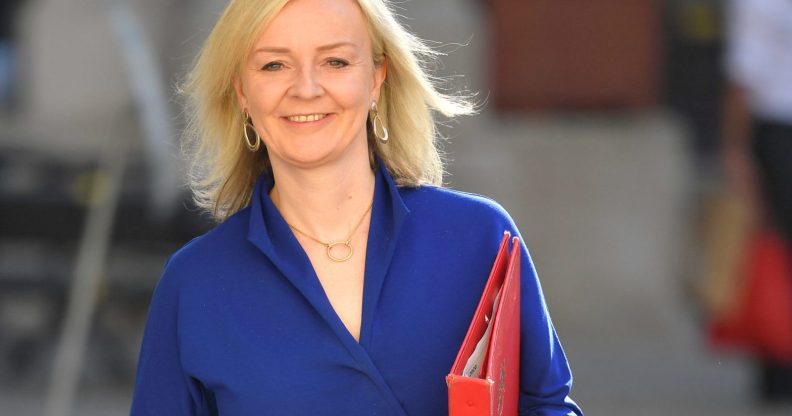Liz Truss claims Gender Recognition Act is ‘not a priority’ for trans people as she officially ditches reforms

Tory equalities chief Liz scrapped Gender Recognition Act reforms in 2020. (Toby Melville – WPA Pool / Getty Images)
Equalities minister Liz Truss has officially ditched plans to push ahead with reforms to streamline the Gender Recognition Act process, despite a public consultation finding overwhelming public support.
The long-delayed results of a 2018 public consultation on gender recognition were finally published on Tuesday (22 September), confirming strong support for efforts to streamline the process of changing legal gender.
The consultation attracted more than 108,000 responses, with 80 per cent of respondents in favour of de-medicalising the process of obtaining a gender recognition certificate, and three-quarters in favour of dropping a requirement for trans people to provide “evidence” of living in their chosen gender.
But in a ministerial statement published alongside the consultation, equalities minister Liz Truss signalled that broader reforms to gender recognition laws will not go ahead.
Liz Truss abandons plans to streamline Gender Recognition Act.
Liz Truss wrote: “We have looked carefully at the issues raised in the consultation, including potential changes to the Gender Recognition Act 2004.
“It is the government’s view that the balance struck in this legislation is correct, in that there are proper checks and balances in the system and also support for people who want to change their legal sex.”
Instead of streamlining the requirements for gender recognition by reforms to the law, Truss promised to “place the whole procedure online” and reduce the current £140 fee to an unspecified “nominal amount” – citing a minority of trans respondents who said cost was the main barriers to gender recognition, compared to the majority who cited the bureaucratic process.

Minister for Women and Equalities Liz Truss (Wiktor Szymanowicz/Barcroft Media via Getty Images)
Campaigners have long called for the UK’s gender recognition laws, which are 16 years out of date and do not align with international best practice, to be modernised.
More than half of trans people do not seek a gender recognition certificate due to the bureaucratic burden, medicalised process and perceived lack of benefit. Others, such as under-18s and non-binary people, are denied access to gender recognition certificates entirely.
A gender recognition certificate is not required to update gender on ID documents such as passports or driver’s licenses, it has no connection whatsoever to access to single-sex spaces, and it’s illegal for businesses to require one to be provided as evidence of gender.
Apparently trans people have to choose between having rights and having healthcare.
Despite consultation results from the trans community concluding that the GRA process “too bureaucratic, time consuming and expensive”, Truss claimed the issue was “not top priority” many for trans people.
She instead cited an already-announced expansion of the over-burdened NHS gender identity clinics, appearing to suggest that the government is incapable of providing the trans community rights and healthcare at the same time.
Truss wrote: “We have also come to understand that gender recognition reform, though supported in the consultation undertaken by the last government, is not the top priority for transgender people. Perhaps their most important concern is the state of trans healthcare.
“Trans people tell us that waiting lists at NHS gender clinics are too long. I agree, and I am deeply concerned at the distress it can cause. That is why we are opening at least three new gender clinics this year, which should see waiting lists cut by around 1,600 patients by 2022.
“The full benefit of the increases in clinical capacity that we’ve been able to secure will lead to greater patient choice, shorter waiting times, better geographical coverage and easier access.”
The clinics cited by Truss are not, in fact, new.
A Government Equality Office spokesperson confirmed to PinkNews the three promised gender dysphoria services are the clinics for adults in Greater Manchester, London and Merseyside, which were announced by the NHS several months ago and appear entirely unconnected to Truss’ conclusions or priorities.

